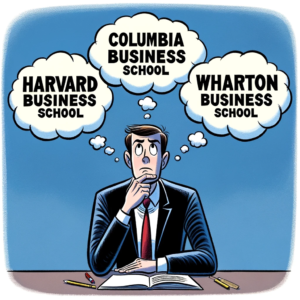
I recently wrote about how important it is to be specific about your plans for graduate school. Since founding Gurufi in 2006, we have helped several thousand clients get into their top-choice Ph.D. and Master’s programs, including hundreds of people seeking admission into hyper-competitive Ivy League and other top-tier programs. Nonetheless, some people quibble with our belief that your personal statement or statement of purpose need to be as specific as possible about your intellectual, academic, and professional mission. The concern -which I will address specifically in a bit- is that being too specific creates three problems: (1) it can make you seem inflexible or uncurious, (2) it might limit your ability to earn admission into a program if there’s not room for exactly what you study, and (3) if you’re admitted, you don’t want to be anchored to an overly restricted vision of what you hope to study. For reasons all cover, all three of these are misguided concerns.
But first, I want to explain why it’s vital to be specific and clear about what you hope to study in graduate school. When applying for a PhD program, the personal statement and statement of purpose are crucial elements (note not every school requires both), more so than in any other academic application. At this advanced level of study, specificity in outlining one’s intellectual interests is not just recommended; it’s imperative. This precision serves several key purposes, each vital to both the applicant and the program.
Ensuring the Right Fit
First and foremost, specificity helps ensure that you, as an applicant, are a good fit for the program. When you’re looking for the right undergraduate institution, the university’s overall rankings are often what people emphasize. But for graduate studies, the department, advisor, or lab are far more important than the overall university. A mid-level state university will often have several elite programs that are better than their equivalents at Harvard and Yale, for instance. But, every lab, advisor, and to a certain extend department, is usually more narrowly focused, so you need to demonstrate that what you want to study fits within what they do. If, for instance, you want to study social and feminist history, you want to find a department that has that strength AND explain in detail your thoughts on that discipline so that it’s clear you’d fit in.
PhD studies are not just about acquiring knowledge; they are about pushing the boundaries of what is known. This journey is profoundly personal and intensely specialized. By clearly articulating your specific interests, you demonstrate an understanding of the program’s scope and how your aspirations align with it. A well-defined area of interest indicates that you have thought deeply about your academic and research path, which is a strong indicator of your readiness for the rigors of a PhD program.
Demonstrating Mastery and Preparedness
A detailed exposition of your intellectual pursuits in your personal statement serves as a testament to your mastery of the field. It shows that you are not merely a passive recipient of information but an active, engaged thinker capable of contributing original ideas. You know the right questions to ask, have a sense of what the key debates are within a field, and maybe even have some ideas for important directions that the field can go. This depth of understanding is crucial for a PhD candidate. By showcasing your well-defined research interests, you illustrate your preparedness for the advanced study and your potential as a future scholar in your field.
Aligning with Program Resources and Opportunities
Specificity in your intellectual interests helps the program assess if they have the necessary resources and opportunities to support your research ambitions. PhD programs are often tailored to the strengths and expertise of their faculty and facilities. By being clear about your research focus, you enable the admissions committee to evaluate whether their program can provide the mentorship, resources, and intellectual environment you need. This alignment is beneficial for both parties: you gain access to tailored support and guidance, and the program invests in a candidate who can fully utilize what they offer.
So if these are the reasons to be specific, what’s the argument for avoiding being too specific… and why are they ultimately misguided?
- Concern: if I am too specific, it will limit my chances at admission because I will really only be applying to work with a few professors or in a few labs, as opposed to being eligible for all of them.
Why it’s wrong: a well-conducted graduate admissions cycle begins with research and outreach. Talk to professors (via email at first) within the program whose interests jive with yours. They will often give you a sense of whether they’re taking students or whether they, or somebody else, might be a good fit for you. If you do this you’ll maximize your chances.
By contrast, if your strategy is that you’re just a “generally good candidate,” that’s not really what most Ph.D. programs are looking for. Rather than being attractive to everyone… you’ll be seen more as an orphan without an intellectual home. After all, a key question that grad schools ask themselves during the admissions cycle is, “under whom will Jane study? Where does she fit in?” If that’s not clear, they won’t just bring you in and hope for the best… you’ll be rejected.
- Concern: if I am too specific in my Personal Statement / SOP, I’ll appear too rigid, dogmatic, or incurious.
Why it’s wrong: Specificity does not equate to inflexibility. In your personal statement, you can balance specificity with openness by exploring various angles and methodologies related to your interest. This approach shows a readiness to engage with different perspectives and adapt your research as it evolves.
For instance let’s say that you’re interested in studying 19th century American politics, and you specifically want to study under Prof. Jones because you agree with his formulation of that period. You explain your ideas and how Jones could help you. You can mitigate the concerns over being too rigid by adding a few sentences that it clear just how expansive your thinking is. Like so: “Though I believe X to be true, I am keen to have this perspective challenged and complicated. For instance, Prof. Danforth’s work suggesting that foreign policy played a large role and Prof. Shah’s recent book exploring how tensions between feminism and racial discourge accelerated America’s path to war are ideas that I must contend with in my thesis. Thus, it would be a genuine pleasure and benefit to learn under these professors as well…”
This approach allows you to use specificity to demonstrate proficiency, AND also use your broader understanding of the field to suggest ways that you are open to broader thinking. Indeed, acknowledging other faculty members whose expertise complements or broadens your proposed study area can add depth to your application. It demonstrates an understanding of the broader academic community and an eagerness to collaborate, enriching the complexity and scope of your research.
- Concern: If I am overly specific in my Personal Statement / SOP, once I get there I might be stuck studying something I am not terribly excited about.
- Why it’s not a problem: This one is easy. Nobody studies exactly what they say they intend to study. Okay… maybe some people do, but most don’t. As such, there is no great difficulty in making tweaks to your intellectual journey on the fly (assuming it’s still within the same field! You can’t switch from history to chemistry or something like that!).
As this shows, specificity in your writing is mostly an opportunity to show that you know enough about the subject to suggest courses of inquiry, ask interesting questions, and know a bit about what you don’t know. You’re not forever married to the ideas you express, and nobody expects you to be.
For more help with your personal statement, check us out at Gurufi.com. Our personal statement editors and consultants have decades of experience helping clients get into top Masters and Ph.D. programs in STEM, humanities, fine arts, and social sciences. Our specialty is helping you craft compelling personal statements that move the needle in your admissions process! For questions, shoot us an email at service@gurufi.com. Check us out on Facebook, Twitter, and LinkedIn.









